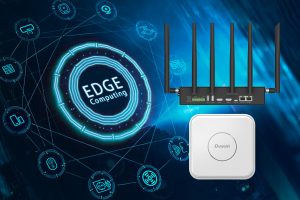


Empower analytics at the edge of your IoT network with the intelligent DusunIoT cloud-ready IoT Edge Gateway for richer business insights, including building management, energy management, manufacturing, transportation and oil & gas. DusunIoT Edge gateways provide multiple connectivity options, and offer options with built-in clients to connect to AWS and Azure cloud services.
An edge computing gateway collects and processes raw data from edge devices with the IT requirement, sending back essential data to cloud, monitoring and control data flow from one network to the next using different protocols and ultimately reducing bandwidth needs.
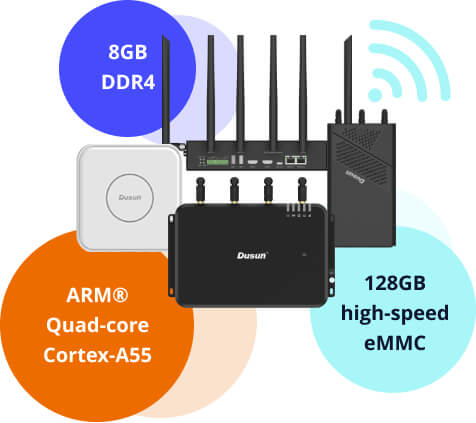



With multiple protocols and wide bandwidth support, Dusun Edge gateway can be compatible with vairous IoT devices and cloud, easier to integrate and normalize your data.
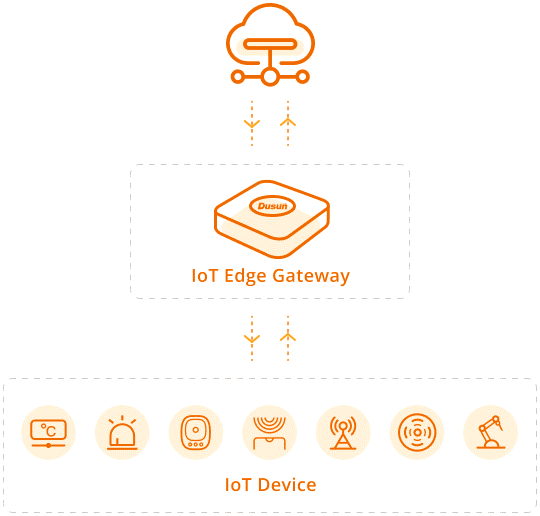
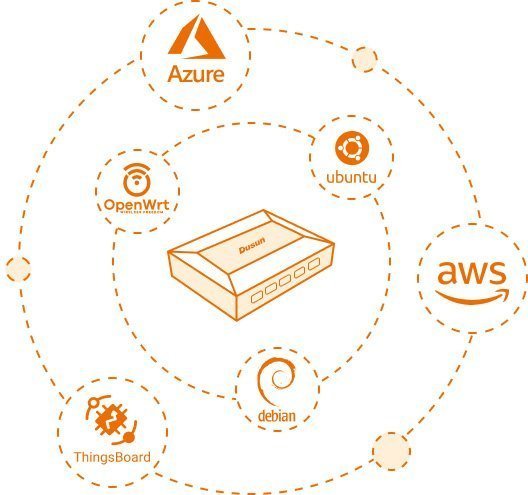
DusunIoT edge gateway consists of cloud-ready edge computers, enabling organizations to connect, monitor and manage IoT assets at scale with more solutions.
Large amounts of data at the edge may pose security and accessibility issues and require more protection, since each compute edge is potentially vulnerable. Dusun offers a complete security protection, including encryption technology to protect data transmission, firewalls to protect network security, and Open System Interconnection to ensure secure Edge device access.
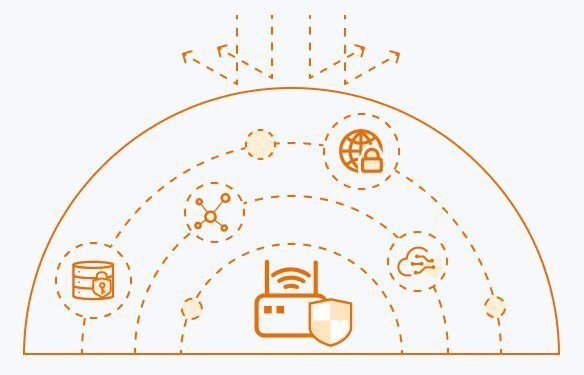
Businesses needed a way to separate the relevant data from the irrelevant before sending it to be processed because so much data is produced every day. The IoT edge gateway, enters the picture at this point.
IoT Edge gateway brings together different communication technologies by extending cloud capabilities to your local edge devices. It’s similar to having your own private cloud with local autonomy, low latency, efficiency, and security.
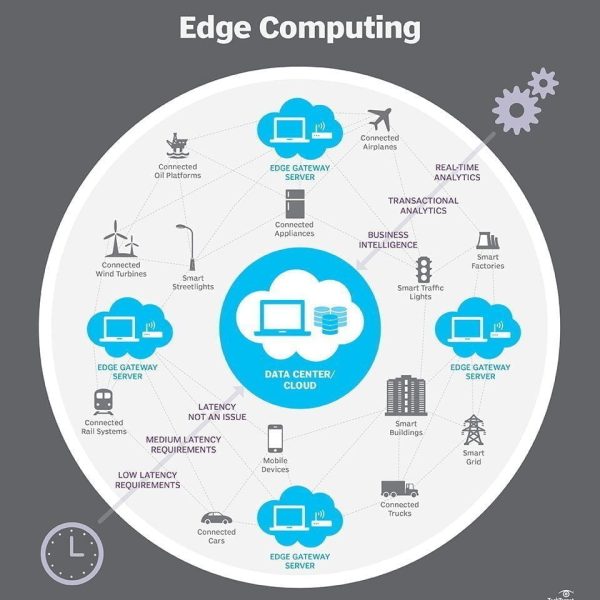
Dusun IoT provides comprehensive, rigorously tested development resources, ensuring high reliability and efficiency. Our expert FAE team offers personalized one-on-one support for partners addressing technical challenges during IoT edge computing gateway secondary development, accelerating time-to-market.


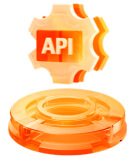

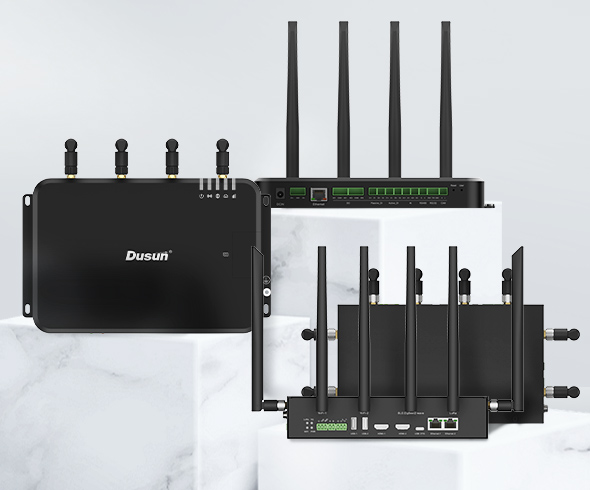

Full certifications including: FCC, CE, IC, WPC, NTC, KC, RCM, SRRC and more


Edge gateways are perfect choices for various applications, including Building Automation, Data Logging, Diagnostics, HVAC, Industrial Automation, Smart Manufacturing, Smart Agriculture, IoV, Smart Grid, Traffic Management, Warehouse, Water / Wastewater, Other
Edge gateways are devices that serve as a bridge between edge devices and the cloud or a central data center:
In summary, edge gateways play a crucial role in connecting and managing edge devices, enabling efficient data processing and communication between the edge and the cloud.
Edge servers and edge gateways play different roles in an edge computing environment. An edge gateway primarily connects edge devices (such as IoT sensors) to the cloud or central data centers, handling functions like data aggregation, protocol translation, and local processing to optimize data transmission and reduce latency. In contrast, an edge server focuses on performing computational tasks, processing large amounts of data, and running applications to deliver low-latency content and real-time analytics. In summary, edge gateways emphasize connectivity and data management, while edge servers concentrate on data processing and application delivery.
Choosing the right edge computing gateway is essential for the successful implementation of an edge computing solution. Here are key factors to consider when selecting an edge computing gateway:
1. Use Case Requirements:
2. Performance Specifications:
3. Connectivity Options:
4. Scalability and Flexibility:
5. Security Features:
6. Management and Monitoring:
User-Friendly Interface: Consider the ease of use of the management interface, which can affect operational efficiency.
7. Environmental Considerations:
8. Interoperability and Ecosystem:
9. Cost and Budget:
10. Vendor Support and Reliability:
Conclusion:
By carefully considering these factors, you can choose an edge computing gateway that aligns well with your specific needs, ensuring that your edge computing deployment is efficient, secure, and scalable. Evaluating different options with these criteria in mind will help you make an informed decision.
An edge gateway and a router serve different purposes within a network. An edge gateway acts as a bridge between edge devices (such as IoT sensors) and cloud services, handling data aggregation, protocol translation, local processing, and security functions to optimize communication and manage data flow. In contrast, a router is primarily responsible for directing data packets between different networks, ensuring that data travels efficiently from one network segment to another based on IP addresses. In summary, edge gateways focus on managing and processing data at the edge of the network, while routers facilitate the interconnection and routing of data across networks.
| Cookie | Duration | Description |
|---|---|---|
| cookielawinfo-checkbox-analytics | 11 months | This cookie is set by GDPR Cookie Consent plugin. The cookie is used to store the user consent for the cookies in the category "Analytics". |
| cookielawinfo-checkbox-functional | 11 months | The cookie is set by GDPR cookie consent to record the user consent for the cookies in the category "Functional". |
| cookielawinfo-checkbox-necessary | 11 months | This cookie is set by GDPR Cookie Consent plugin. The cookies is used to store the user consent for the cookies in the category "Necessary". |
| cookielawinfo-checkbox-others | 11 months | This cookie is set by GDPR Cookie Consent plugin. The cookie is used to store the user consent for the cookies in the category "Other. |
| cookielawinfo-checkbox-performance | 11 months | This cookie is set by GDPR Cookie Consent plugin. The cookie is used to store the user consent for the cookies in the category "Performance". |
| viewed_cookie_policy | 11 months | The cookie is set by the GDPR Cookie Consent plugin and is used to store whether or not user has consented to the use of cookies. It does not store any personal data. |

